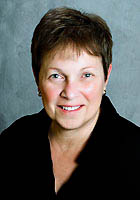
After 37 years at Wesleyan, Head Coach Gale Lackey announced that the 2014 season would be her last at the helm of the volleyball team. Since joining the University’s staff in 1978, Lackey has compiled an overall record of 490-406 over 16 winning seasons with the team, 21 NESCAC tournament bids, and one NCAA tournament appearance in 2001, when Lackey was named NESCAC Coach of the Year.
Lackey holds the title of Adjunct Professor of Physical Education at Wesleyan and was named an Associate Athletic Director in 2001. She has a Stage 1 level international coaching certification from the FIVB [Federation Internationale de Volleyball] and was inducted into the Connecticut Volleyball Hall of Fame in 2010. In light of her upcoming retirement, Lackey spoke to The Argus about her most memorable moments as Wesleyan’s head coach and the ways in which the program has changed over the years under her supervision.
The Argus: How did you initially become involved with volleyball? Can you remember any particularly poignant first experiences with the sport?
Gale Lackey: I played volleyball competitively from the age of 13 to 39. I played in high school when there were not many opportunities for girls to play organized or varsity sports. My junior year, we went undefeated and that most likely gave me a strong desire to stay with the sport.
A: At what point in your life did you know you wanted to pursue a career in coaching?
GL: My last few years of undergraduate study, I attended a few coaching clinics and coached at a few summer camps, and I thought I would relish a coaching career.
A: How does coaching Wesleyan volleyball compare to other coaching jobs you’ve had in the past, whether during your year coaching volleyball at the University of Bridgeport or as head coach of Wesleyan’s field hockey team?
GL: Coaching at Wesleyan has been such a longstanding part of my coaching life that there really are no comparisons. Coaching different sports, however, brings up some. Coaching field hockey and lacrosse required being concerned with weather issues, for one thing. Also, the teams are larger. Volleyball is such a reciprocal sport. Everything that happens is connected to the contact before. There is no clock in volleyball, so coaching requires your players to understand they must score the last point to win and they must do that for three sets to win a match. You are not managing a clock but it requires tremendous mental focus. Every rotation is a mini-game and you need to capitalize in your strong rotations.
A: Do your coaching methods mirror those of any mentors you’ve had in the past? How, if at all, has your coaching philosophy changed over almost 40 years of coaching?
GL: I have had many mentors over the years and I have read many books related to coaching in various sports and sports psychology. One of my favorite volleyball coaches to talk with and to read is retired U of Minnesota coach Mike Hebert. I met him in the ’70s when he was coaching at Pittsburgh and his approach to the game is very cerebral and team-oriented. I know I have attempted to tweak my coaching philosophy over the years and over generations of players, but primarily I have a process versus outcome style with emphasis on training and I also possess a “team first” style. I am always having my players ask themselves what they can bring to the team experience, not what they can get from it, and to ask, “How can I serve my team today?” Regardless of what sport I have coached, to stress a competitive nature, I have always tried to have my teams adopt a style of doing what was hard for the opponent, not what was easy for them.
A: Looking back on your many years at the helm of Wesleyan’s volleyball team, are there any particular moments that stand out in your mind? What would you say you’re most proud of, looking back?
GL: The best memories and moments are about the people I have met, including colleagues, assistant coaches, families, but most of all the players. I enjoy it because I enjoy the players I have coached. I don’t think I would have experienced the same amount of joy in my life had I not come across many of the young women I have coached at Wesleyan. I can’t say enough about them. The 2000 and 2001 seasons do stand out because of the success we experienced: an ECAC Championship, a regular season NESCAC Championship, and an NCAA appearance. Members of those teams also went on our trip to Cuba in January of 2001. That was a memorable experience.
A: After cementing such an impressive coaching legacy, what’s next for you? Do you plan to continue being involved with Wesleyan’s volleyball program down the road?
GL: After some time away, I probably will stay in the sport, providing clinics for coaches covering various topics. I will enjoy coming back to see Wesleyan teams compete as a fan and spectator, especially the volleyball team. Their future looks bright!


Leave a Reply